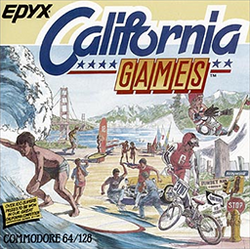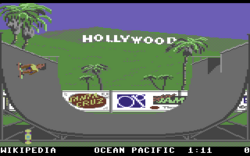California Games
Topic: Software
 From HandWiki - Reading time: 6 min
From HandWiki - Reading time: 6 min
| California Games | |
|---|---|
 European Commodore 64/128 cover art | |
| Developer(s) |
|
| Publisher(s) | Lynx Atari Corporation |
| Designer(s) | Chuck Sommerville Ken Nicholson Kevin Norman Kevin Furry Jon Leupp |
| Artist(s) | Jenny Martin Susan Greene Sheryl Knowles Paul Vernon |
| Composer(s) | Chris Grigg
Gil Freeman
|
| Series | California Games |
| Platform(s) |
|
| Release | June 1987
|
| Genre(s) | Sports |
| Mode(s) | Single-player, multiplayer |
California Games is a 1987 sports video game developed and published by Epyx for the Apple II and Commodore 64. Branching from their Summer Games and Winter Games series, it is a collection of outdoor sports purportedly popular in California. The game was successful and was soon ported to other home computers and video game consoles, and was the pack-in game for the Atari Lynx when that system launched in September 1989. It was followed by the sequel California Games II in 1990.
Gameplay

The events vary slightly per platform, but include half-pipe, footbag, surfing (starring Rippin' Rick),[12] roller skating, BMX, and flying disc.
Development
Epyx reportedly used more than three man-years to develop California Games, including a surfer who wrote the surfing game.[13] Several members of the development team moved on to other projects. Chuck Sommerville, the designer of the half-pipe game in California Games, later developed the game Chip's Challenge, while Ken Nicholson, the designer of the footbag game, would go on to invent of the technology used in Microsoft's DirectX. Kevin Norman, the designer of the BMX game, went on to found the educational science software company Norman & Globus, makers of the ElectroWiz series of products.
Ports
Originally written for the Apple II and Commodore 64, it was eventually ported to Amiga, Apple IIGS, Atari 2600, Atari ST, MS-DOS, Sega Genesis, Amstrad CPC, ZX Spectrum, Nintendo Entertainment System, MSX and Master System. The Atari Lynx version was the pack-in game for the system when it was launched in September 1989.[9] A version for the Atari XEGS was planned and contracted out by Atari Corporation to Epyx in 1988, but no code was delivered by the publication deadline.[14].
Reception
| Reception | |||||||||||||||||||||||||||||||||||||||||||||||||||||||||||||||||||||||||||||||||||
|---|---|---|---|---|---|---|---|---|---|---|---|---|---|---|---|---|---|---|---|---|---|---|---|---|---|---|---|---|---|---|---|---|---|---|---|---|---|---|---|---|---|---|---|---|---|---|---|---|---|---|---|---|---|---|---|---|---|---|---|---|---|---|---|---|---|---|---|---|---|---|---|---|---|---|---|---|---|---|---|---|---|---|---|
| |||||||||||||||||||||||||||||||||||||||||||||||||||||||||||||||||||||||||||||||||||
| |||||||||||||||||||||||||||||||||||||||||||||||||||||||||||||||||||||||||||||||||||
California Games was a commercial blockbuster.[29] With more than 300,000 copies sold in the first nine months, it was the most successful Epyx game, outselling each of the four previous and two subsequent titles in the company's "Games" series.[30][31] CEO Dave Morse said that it was the first Epyx game to appeal equally to boys and girls during playtesting.[32] The game topped 500,000 units sold by 1989, at which time Video Games & Computer Entertainment reported that sales were "still mounting".[29]
Computer Gaming World recommended the game, calling it fun.[33] Compute! called California Games "both inventive and charming".[34] "Epyx Software gives us a refreshing treat", PC Magazine said of the PC version, citing the surfing game's "outstanding animation and realistic graphics".[13] In a capsule review for STart, Clayton Walnum said California Games "isn't a bad package, especially since it comes free with the Lynx". He found the BMX and surfing events great fun but deemed the skateboarding event frustrating and said the foot-bag event is pleasant but quickly wears thin.[35]
In 1996, Next Generation listed the "Games" series collectively as number 89 on its "Top 100 Games of All Time". The magazine stated that though the games had great graphics for their time, their most defining qualities were their competitive multiplayer modes and "level of control that has yet to be equaled".[36] In 2004, the Atari Lynx version of California Games was inducted into GameSpot's list of the greatest games of all time.[37]
Legacy
| Parts of this software (those related to section) need to be updated. Please update this software to reflect recent events or newly available information. (July 2025) |
The video game was followed in 1988 by VCR California Games - a board game with a companion VCR tape featuring short clips of various sports.[38][39] The game was followed in 1990 by California Games II, but the sequel failed to match the original's success.
A California Games television series was considered in the late 1980s as part of the Super Mario Bros. Power Hour, a one-hour animation block of Nintendo-focused video game adaptations. Concept art was produced for the project by DIC Animation City. Only the Mario and Zelda segments for the block were ultimately produced, airing in 1989 as part of The Super Mario Bros. Super Show!.[40]
The game was released for mobile phones in the Java format . The Commodore 64 version was released for the Wii's Virtual Console service in Europe on April 11, 2008, and in North America on July 6, 2009.[41]. The current rights holder is Epyx Games, LLC and they are working on a revival of this title with one of their existing development partners.[42]
References
- ↑ "Availability Update". Computer Entertainer 6 (4): p. 14. July 1987. https://www.ataricompendium.com/archives/newsletters/video_game_update/computer_entertainer_jul87.pdf.
- ↑ "Availability Update". Computer Entertainer 6 (8): p. 14. November 1987. https://www.ataricompendium.com/archives/newsletters/video_game_update/computer_entertainer_nov87.pdf.
- ↑ "Atari VCS game release dates". https://www.atariarchive.org/atari-vcs-game-release-dates/.
- ↑ "California Games". https://spectrumcomputing.co.uk/entry/790/ZX-Spectrum/California_Games.
- ↑ "Games Coming". The Official Sega Club UK #4. Mastertronic. July 1989. p. 2. https://archive.org/details/official-sega-club-uk-04/page/n1/mode/2up.
- ↑ "Availability Update". Computer Entertainer 8 (3): 16. June 1989. https://archive.gamehistory.org/item/703a07b2-9936-4cd5-b90a-0d077c40970b.
- ↑ "NES Games". Nintendo of America. https://www.nintendo.com/consumer/downloads/nes_games.pdf.
- ↑ "LYNX Soft" (in ja). GAME Data Room. http://tk-nz.game.coocan.jp/gamedatabase/software/DB_ATM_LX1989-1991.html.
- ↑ 9.0 9.1 "Atari and Epix Team Up". Electronic Gaming Monthly (Sendai Publications) (3): 70–72. September 1989. https://retrocdn.net/images/b/b3/EGM_US_003.pdf. "Among the first games, which will retail for $19.95, are Epyx's Impossible Mission and California Games (which comes bundled with the system) [...]".
- ↑ "Review Crew: California Games". Electronic Gaming Monthly (31): 28. February 1992. https://archive.org/details/Electronic_Gaming_Monthly_31/page/n29/mode/1up.
- ↑ "The Release Schedule". Computer Trade Weekly (Opportunity Publishing) (366): 27. 9 December 1991. https://retrocdn.net/images/8/82/CTW_UK_366.pdf.
- ↑ "Sega Visions - Issue 1". Sega Visions. June 1990. p. 35. https://archive.org/stream/Sega-Visions-Issue-01#page/n39.
- ↑ 13.0 13.1 Trivette, Donald (1988-06-28). "Catch the Wave, Cop Some Rays, and Hang Ten with California Games". PC 7 (12): 412. https://books.google.com/books?id=-9qzy8Z8SKEC&pg=PT2. Retrieved 2025-05-03.
- ↑ John Hardie, National Videogames Museum (2020-12-04). "November 30, 1998 ATARI Corp. Letter to Epyx inquiring about the XE conversion of California Games". https://www.facebook.com/photo?fbid=10221846349820667.
- ↑ "Console Wars". ACE (26 (November 1989)): 144. October 1989. https://retrocdn.net/images/d/d9/ACE_UK_26.pdf#page=144.
- ↑ "Crash". Worldofspectrum.org. 2017-10-15. http://www.worldofspectrum.org/showmag.cgi?mag=Crash/Issue49/Pages/Crash4900027.jpg.
- ↑ "Computer & Video Games". Worldofspectrum.org. 2017-10-15. http://www.worldofspectrum.org/showmag.cgi?mag=C+VG/Issue072/Pages/CVG07200036.jpg.
- ↑ 18.0 18.1 "Complete Games Guide". Computer and Video Games (Complete Guide to Consoles): 46–77. 16 October 1989. https://retrocdn.net/images/9/98/CompleteGuideToConsoles_UK_01.pdf#page=46.
- ↑ "Guide: Sega". Computer and Video Games (Complete Guide to Consoles: Volume IV): 89–110. November 1990. https://archive.org/details/Complete_Guide_to_Consoles_Volume_IV_1990_EMAP_Publishing_GB/page/n88.
- ↑ Lesser, Hartley; Lesser, Patricia; Lesser, Kirk (January 1988). "The Role of Computers". Dragon (129): 32–42. https://archive.org/details/DragonMagazine260_201801/DragonMagazine129/page/n37/mode/2up?q=%22california+games%22. Retrieved August 30, 2021.
- ↑ "Sinclair User". Worldofspectrum.org. 2017-10-15. http://www.worldofspectrum.org/showmag.cgi?mag=SinclairUser/Issue071/Pages/SinclairUser07100021.jpg.
- ↑ "The Games Machine". Worldofspectrum.org. 2019-02-27. http://www.worldofspectrum.org/showmag.cgi?mag=TheGamesMachine/Issue01/Pages/TheGamesMachine0100079.jpg.
- ↑ "Archived copy". http://www.ysrnry.co.uk/articles/californiagames.htm.
- ↑ "Zzap!64 100th Issue Pull-Out Special Page 5". Zzap64.co.uk. http://www.zzap64.co.uk/zzap100/100thspec5.html.
- ↑ "Software A-Z: Master System". Console XS (United Kingdom: Paragon Publishing) (1 (June/July 1992)): 137–47. 23 April 1992. https://archive.org/details/console-xs-01/page/137.
- ↑ "MicroHobby". Worldofspectrum.org. http://www.worldofspectrum.org/showmag.cgi?mag=MicroHobby/Issue163/Pages/MicroHobby16300022.jpg.
- ↑ Mega rating, issue 9, page 23, Future Publishing, June 1993
- ↑ MegaTech rating, EMAP, issue 6, page 76, June 1992
- ↑ 29.0 29.1 Worley, Joyce (December 1989). "Mega Hits: The Best of the Best". Video Games & Computer Entertainment: 130–132, 137, 138.
- ↑ Maher, Jimmy (2015-06-19). "The Evolution of the (Epyx) Games". The Digital Antiquarian. http://www.filfre.net/2015/06/the-evolution-of-the-epyx-games/.
- ↑ Maher, Jimmy (2016-12-22). "A Time of Endings, Part 2: Epyx". http://www.filfre.net/2016/12/a-time-of-endings-part-2-epyx/.
- ↑ Ferrell, Keith; Keizer, Gregg (September 1988). "Epyx Grows with David Morse". Compute!: p. 10. https://archive.org/stream/1988-09-compute-magazine/Compute_Issue_100_1988_Sep#page/n11/mode/2up.
- ↑ Teverbaugh, Rick (October 1987). "Sports Scoreboard". Computer Gaming World (40): 42. http://www.cgwmuseum.org/galleries/issues/cgw_40.pdf. Retrieved 17 April 2016.
- ↑ Bobo, Ervin (November 1987). "California Games". Compute!: p. 40. https://archive.org/stream/1987-11-compute-magazine/Compute_Issue_090_1987_Nov#page/n41/mode/2up.
- ↑ Walnum, Clayton (December 1990). "The Lynx Collection". STart (Antic Publishing) (39): 66–67. https://archive.org/stream/STart-Magazine-Issue-39.
- ↑ "Top 100 Games of All Time". Next Generation (Imagine Media) (21): 39. September 1996.
- ↑ "The Greatest Games of All Time: California Games". http://www.gamespot.com/gamespot/features/all/greatestgames/p-36.html.
- ↑ "VCR California Games (1988)". https://boardgamegeek.com/boardgame/8483/vcr-california-games.
- ↑ "VCR California Games Overview". https://epyxgames.com/titles/vcr-california-games.
- ↑ "The Super Mario Bros. Super Show people once tried to make bizarre Metroid and Castlevania cartoons". 8 May 2019. https://www.polygon.com/2019/5/8/18536769/super-mario-bros-power-hour-metroid-castlevania-cartoons-dic.
- ↑ "California Games (Virtual Console) Review". Vc-reviews.com. 7 July 2009. http://www.vc-reviews.com/games/c64/california_games.
- ↑ "California Games". 2025-08-28. https://epyxgames.com/titles/california-games/.
External links
- California Games package and manual scans at c64sets.com
- California Games at SpectrumComputing.co.uk
- Template:Abime
- California Games for the Lynx at Atari Age
 |
 KSF
KSF